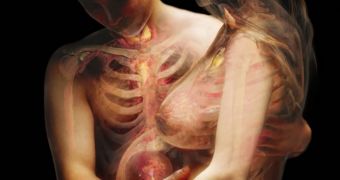Men and women are clearly different species. And this is more than just physical: it goes in all inner organs, including the brain, explaining behavioral differences but also the opposite desires, sensitivities, preferences...
The brain is masculinized from the womb by testosterone (its lack determines the feminization of the brain), generating anatomical differences that explain why the males find it harder to read facial expressions than women do, but explain their higher ability to visualize objects in three dimensions or read maps, labyrinths and diagrams.
When it comes to women - the corpus callosum, the major white matter tract, connecting the two brain hemispheres, allowing their intercommunication - is much wider. That's why women have their brain functions more finely distributed, while men have a more "asymmetrical" brain, with more specialized areas and, for example, a lesion on the left hemisphere, which can induce speech loss, is more devastating for men. If the stroke is only on one side of the brain, a woman can rehabilitate, while the man may have more trouble with it, because the woman may be able to perform tasks using the other side of her brain. This also mean that men are more prone to senile dementia and the age-related decline is much steeper than in women.
But this also explains why women have better concrete thinking while men have a better abstract one (and are better at chess and composing music) and why women prefer to repeat loudly what they are learning while men must learn in silence. The female brain is 11 % lighter than the male brain, still IQ coefficients of the women are similar to those of the men. That's because men have less gray matter (that processes information) and more white matter (that transmits information). This explains why the female brain learns easier and men have more motor ability.
Women also express their emotions better, because their emotional thinking centers are close to the speech centers, so they can verbalize their emotions better. Men have a simpler limbic system, and their emotions are bound to action.
Researches revealed that gay men have a larger posterior corpus callosum than heterosexual men. This means that homosexuals have more "womenized" brains (as found also by tests exploring their behavioral skills), fact that could be explained by hormonal ratios and balances in the womb. This imbalance could have a genetic reason, but not necessarily.
A breakthrough in explaining a major cause of brain functioning in men and women has just been made at the Swedish medical university Karolinska Institutet: why brain's serotonin (the neurotransmitter called "the happiness hormone") system is different between the sexes, making the women more prone to depression and chronic anxiety.
The team using a PET scanner found that that women have much more serotonin receptors (binding sites) in certain brain nuclei. They also have lower amounts of the protein transporting serotonin back into the neurons releasing it. This protein is blocked by most of the antidepressants (SSRIs). The research will be presented in a doctoral thesis of Hristina Jovanovic at the end of February.
"We don't know exactly what this means, but the results can help us understand why the occurrence of depression differs between the sexes and why men and women sometimes respond differently to treatment with antidepressant drugs," said lead researcher Anna-Lena Nordstr?m, associate professor.
The serotonin system in healthy women was also found to be different from that possessed by women with severe premenstrual mental symptoms, in whom the serotonin system is not so flexible in responding to the hormone changes of the menstrual cycle as in PMS free women.
"These findings indicate that when developing antidepressants and anti-anxiety drugs, scientists should evaluate their effect on men and women separately, as well as their effects before and after menopause," said Nordstr?m.

 14 DAY TRIAL //
14 DAY TRIAL //